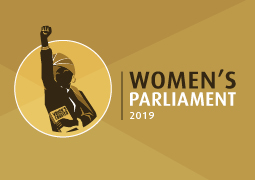
The sixth Parliament hosted the first instalment of Women's Parliament with the theme Gender and institutionalism: Towards strengthening the National Gender Machinery as a response to addressing Gender-Based Violence in South Africa. The goal of the gathering was to review the Women’s Charter for Effective Equality, which was adopted 25 years ago.
Speaking on the Women’s Charter: An Unfolding Trajectory of Women’s Struggle, Women’s power and Women’s Voices in History, the Speaker of the National Assembly, Ms Thandi Modise, narrated the long history of women’s struggle for freedom and the events that led to the inception of the Women’s Charter. She emphasised that one cannot talk about the charter without talking about the pain of black females.
The charter is non-partisan, she said, and involved black and white women, for “the pain of women knew no colour, even during apartheid. As we were counting the bodies of our dead children, the white children were doing the same. As such, they could also relate to the life of a black woman at the time.”
She stated how the charter was compiled. “We went from village to village, from town to town, from city to city to hear the demands and wishes of women and out of that long shopping list the charter emerged.”
Women’s agitation for equal rights continued well into the democratic transition. “When negotiations of a new democratic government were held, Ma Albertina Sisulu questioned the absence of women in this process. “Although that did not make us popular, women were later represented.”
She was unapologetic when she stressed that the land question is at the centre of women’s advancement. “Women’s advancement is tied to their access to land, especially in rural areas. Because land is tied to the economy and we can’t separate women’s rights from economic liberty.”
She called for the strengthening of women’s caucuses in legislatures, for it could be an instrument that could advance gender machinery and oversight over women’s rights. “We need women’s caucuses for we need to sit and talk to ourselves in legislatures. And if we think that as women we can do it alone, we are mistaken.”
The Deputy Minister of Women, Youth and Persons with Disabilities in the Presidency, Prof.Hlengiwe Mkhize, spoke on gender machinery. After 1994 we ended up with a certain number of women representation in Parliament. But that was not enough because “the women’s struggle for equal rights did not end due to that, said, who spoke on gender machinery. Hence, we needed a gender machinery that would benefit not the few, but embrace all women in dealing with their inequalities.”
Thereafter, she pointed out, there was a debate whether we need a women’s ministry or not to advance women’s rights. There were disparate views on the matter. “One was that women issues would be marginalised by such a ministry. But eventually a consensus was reached that a ministry is needed, hence we ended up with one.”
She congratulated the fact that the women’s ministry has ensure that gender machinery is embedded into the seven key priorities of government to ensure that women issues are not marginalised. “As a result women’s issues are now not an afterthought, they are, instead, at the centre of these priorities.”
In her view, gender violence cannot not be isolated from economic issues. “If we don’t talk about economic issues and how they are related to gender violence it will be difficult to address gender violence.”
She called on women to stand together. “If we underestimate the need to stand together, we will lose our battle and the gains of those who came before us.”
Speaking on Role of the Ministry of Police in Budgeting for the Prevention of Gender-Based Violence, the Deputy Minister of Police, Mr Cassel Mathale, decried the high levels of gender violence. But assured the delegates that his department is doing something to curb this tide. “We have introduced a six-point plan that sees to it that the victims of this crime are treated with dignity and in a sensitive manner to avoid second victimisation. Now, the victims and their families will be subjected to medical examinations, psychological assistance and will be given feedback on their cases regularly.”
There is also a plan to recruit women to work in the facilities that take care of gender violence victims. “To make them more receptive to the victims.” To illustrate that police are serious about gender violence, he said “there are 658 life sentences were meted out to perpetrators of gender violence. This has help the families of victims to find closure.”
Ms Lindelwa Ntlonze, Chairperson of South African Local Government Association (Salga) Women Commission, said they will have gender budgeting instrument that will monitor and evaluate the progress of the advancement of women’s rights at local level. “This budget will be used to set indicators and to assess their progress. And they will form part of the Integrated Development Plan of the municipalities.”
Miss Tertiary South Africa 2019, Ms Desiree Dlakude, commended the fact women are climbing the corporate ladder. More and more women are, in her view, reversing patriarchy. “We are breaking the barriers. Women are no longer confined to domestic areas and are no longer subordinated to men. We changing the narrative and out strength lies in our unity.”
Abel Mputing
29 August 2019

